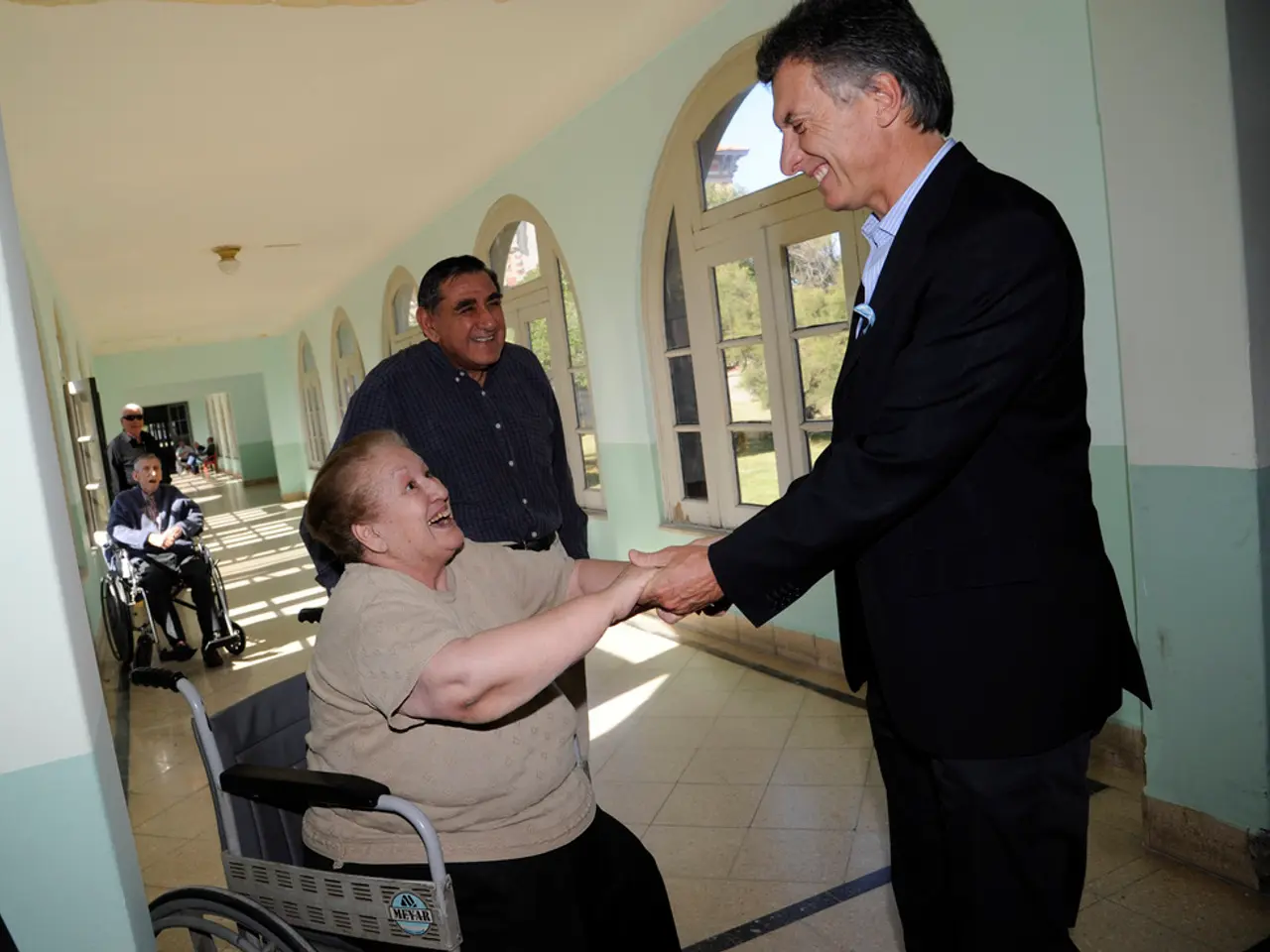Independence Day for People with Disabilities: Pushing for Equal Job Opportunities and Equality
Everyday actions can make a significant difference in promoting disability inclusion and fostering a culture of belonging for people with disabilities. Here are some simple yet impactful practices, as suggested by author Lauren Kim, an innovative marketing graduate and passionate writer who believes in the power of intentional storytelling to make a difference.
Embracing Inclusive Language
Using plain language by default and asking for and using correct pronouns is a simple yet respectful way to show inclusivity. This practice helps to ensure clarity and respect in communication.
Advocating for Accessible Physical Features
Being aware of and advocating for accessible physical features in your environment is essential. This can involve reporting the absence of accessible parking, curb cuts, push-button doors, and accessible routes, and working towards their implementation.
Supporting Diverse Identities
Offering visible support by acknowledging and celebrating diverse identities is another key aspect of promoting inclusion. This could be through inclusive praise, storytelling sessions, or sharing respectful calendar notes about accessibility needs or disability-related events.
Making Digital and Virtual Spaces Accessible
In today's digital age, making digital and virtual spaces accessible is crucial. This can be achieved by using accessible virtual meeting backgrounds, providing closed captioning, and ensuring communication materials have high contrast and readable fonts.
Practicing Bystander Intervention
Practicing bystander intervention by recognizing and addressing microaggressions or exclusionary behaviors related to disability is an important step towards creating a more inclusive environment.
Encouraging Inclusive Social Interactions
Creating social interactions and team rituals that do not rely on assumptions about physical abilities or require specific cultural norms that might exclude people with disabilities is another way to promote inclusion.
Providing Quiet Spaces
Providing quiet spaces or calm areas in events and workplaces for those with sensory sensitivities or invisible disabilities is a thoughtful practice that shows consideration for all individuals.
Educating Oneself and Others
Educating oneself and others about hidden disabilities and disability etiquette is essential for better assisting and including people with diverse needs.
Supporting Disability-Related Community Initiatives
Supporting disability-related community initiatives and advocacy groups, making tangible contributions to accessibility improvements locally, is a powerful way to show commitment to inclusion.
Soliciting and Using Feedback
Soliciting and using feedback from people with disabilities to continuously improve accessibility and inclusion in daily environments is a proactive approach to fostering a culture of inclusion.
These small, everyday actions, while seemingly insignificant, collectively make spaces more accessible and foster a culture of belonging for people with disabilities. They are part of an ongoing process, not limited to one day a year, such as National Disability Independence Day, celebrated annually on July 26th to commemorate the Americans with Disabilities Act.
Advocacy starts with listening to the needs of individuals with disabilities. Small daily actions, like starting conversations about accessibility, can make a difference in promoting inclusion. National Disability Independence Day serves as a reminder to consider how one's voice, platform, or support can lift someone else up.
It's important to remember that not all disabilities are visible, many are invisible or non-apparent, such as chronic illnesses, learning differences, or mental health conditions. Teaching children about inclusion from a young age can lead to a more inclusive future.
Inclusion involves ensuring individuals with disabilities are supported, understood, and welcomed in all aspects of life. It's about building habits, not just checking boxes. It involves active listening, adjusting assumptions, and inviting participation from all voices.
Small, consistent steps can open doors, break down stereotypes, and help create communities where everyone feels valued. National Disability Independence Day emphasizes the importance of accessibility beyond physical spaces. It's a call to action for everyone to contribute to a more inclusive world.
- In workplaces and schools, showing compassion towards individuals with disabilities by understanding their unique needs and adopting inclusive language can make a change in fostering a culture of belonging.
- With the surge of blogging platforms, posting stories about people with disabilities and their experiences can help promote awareness, education, and social good.
- In our global community, advocating for educational reform and helping to create accessible digital and physical environments can have a significant impact on people with disabilities.
- At events and community gatherings, setting aside quiet spaces or providing resources for attendees with sensory sensitivities can lead to inclusiveness and a more empathetic environment.
- By supporting local initiatives and advocacy groups that focus on mental health, education, and self-development, we can contribute to bettering the lives of people with disabilities in our neighborhoods.
- Encouraging and facilitating inclusion in our families and among our friends can lead to long-lasting changes in how we perceive and treat people with disabilities.
- Giving to organizations and causes that promote disability inclusion, such as educational scholarships or accessibility improvements, can have a lasting impact on people's lives.
- Sharing resources about disability etiquette and educating ourselves and others on the importance of compassion and kindness towards people with disabilities can help break down barriers and change perceptions.
- By participating in community events and discussions about disability inclusion, we can contribute to the ongoing conversation and work to create a more inclusive world for all people.
- Celebrating National Disability Independence Day serves as a reminder to not only appreciate the progress made but also to commit ourselves to consistent, everyday actions that promote inclusion and foster a culture of belonging for people with disabilities.




